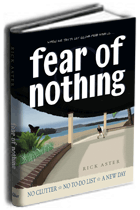A month ago in the Happiness Project blog, Gretchen Rubin wrote about her challenges with her resolution to “Use up what you have”:
And sometimes I find myself saving things instead of using them, even when that makes no sense. I buy new white t-shirts, then “save” them. I don’t use the lovely stationery my sister gave me for Christmas, I’m “saving” it. But not using things is the same as wasting them. I want to put things to work and use them up.
The difficulty with this, of course, is a matter of scale. If you have an ordinary amount of possessions, it is already more than you can possibly use up.
There are so many possessions, and so little time. If you’re focusing on wearing your new white T-shirts (one of Gretchen’s examples) that could mean your travel souvenir T-shirts are staying in the closet (that’s an example from my own wardrobe). Or, if you are focused on using all your power tools (wouldn’t it be nice to use each one at least once this year?), you may not have time to watch all the movies that are stacked up on a shelf near the television. Acquiring possessions has become so easy that life is literally not long enough for you to fully use them all — even if, like me, you have a very ordinary amount of possessions and plan to live for another 100 years.
This difficulty is especially apparent when it comes to clothing. If you have 50 shirts that are suitable for the season — not a large number by the current American standards for a wardrobe — it’s probably not realistic to plan to wear each of them at least once over the course of the season. A season, after all, is only 91 days. But imagine that you were to systematically wear all your clothing, perhaps by rotating it in the closet so that everything comes to the front eventually. Then, you would find that you would never wear out any of it, or wear it often enough to tire of it, even if you did not buy any more clothing for the next 10 or 20 years.
The same is true of many ordinary supplies, even if it is not always so obvious. If you now do most of your writing on a computer keyboard, you will probably find it impossible to use up the ink in a handful of ball-point pens, and it may take decades to go through what used to be a small stack of Post-It Notes. I have only recently come to realize how long shampoo lasts. I don’t have particularly long hair and don’t wash it every day, so a liter bottle of shampoo could last for a year or two.
It still is, as Gretchen puts it, “so satisfying” to completely use something you own. Looking at the inverse condition, if you do not use what you own, it becomes almost impossible to feel prosperous — and the resulting feeling of lack is a big part of what drives people to go shopping and buy more things they don’t have time to use. Focusing on using what you have can be a starting point for feeling the prosperity that you already have in a material sense, and turning the corner on clutter. You can use up or wear out some of your possessions — and when you can’t use them up, you can at least experience the value that is available in them, within the limits of the time you can put into each activity. This shifts your focus from future action — which is really where your focus is in shopping — to present action, and it is when you focus on the present that you have the chance to move your life forward.



No comments:
Post a Comment